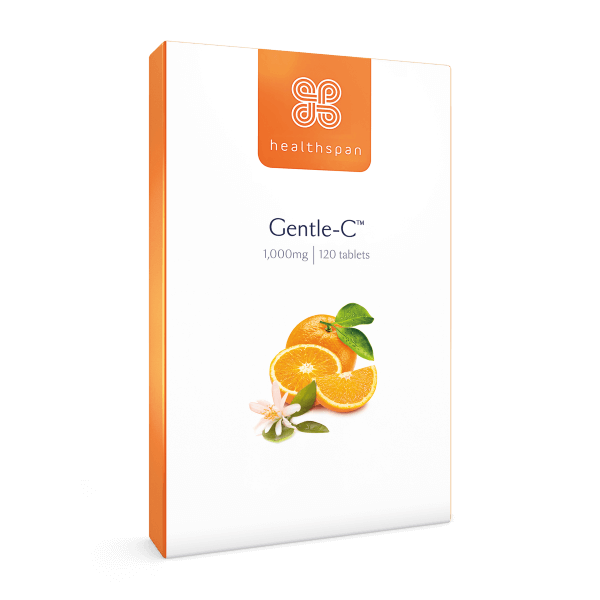Vitamin C, or ascorbic acid, is a vital nutrient that we must get from food sources such as citrus fruit, berries, blackcurrants and green leafy vegetables. However, some people find higher doses upset their digestion. This is where gentle, non-acidic forms of vitamin C can help.
The recommended amount of vitamin C we need per day to prevent deficiency symptoms is 80mg, but higher amounts are widely taken to help boost immunity. The upper tolerable level for long-term use in supplement form is 1,000mg vitamin C per day, but some people find these higher amounts upset their digestive system.
Stomach acidity
The stomach produces hydrochloric acid as well as enzymes that digest food, and it protects itself from these chemicals by secreting a layer of mucus and bicarbonate as a barrier. Despite this protection, some people still develop symptoms of stomach acidity. This is often related to a condition known as gastro-oesophageal reflux disease (GORD), in which stomach contents reflux into the sensitive oesophagus above.
Heartburn and indigestion are especially common in those who are overweight, smoke, are anxious or stressed or who have a hiatus hernia (in which part of the stomach moves up into the chest). In these cases, taking acidic supplements - even a weak acid such as vitamin C - can trigger a burning discomfort. Some people are more sensitive to the acidity of vitamin C than others, and may also notice that vitamin C supplements have a laxative effect. Again, this is related to the acidity of vitamin C rather than to any specific toxicity.

Gentle-C
High-strength vitamin C in a stomach-friendly formulation
- Immune health and joint support for sensitive stomachs
- 1,000mg vitamin C in a single daily tablet
Gentle vitamin C
If you are prone to indigestion or bowel looseness, then non-acid 'gentle' vitamin C is available, which will not upset your digestive system. Such supplements are known as buffered vitamin C, as the acidity is buffered, or neutralised, by chemically combining it with a mineral. When combined with calcium, for example, to produce calcium ascorbate, this greatly reduces the acidity of vitamin C and makes it more gentle on the stomach.
Another option is a sustained-release form of vitamin C which, as its name suggests, releases ascorbic acid at a constant slow rate over six to eight hours. Not only does this ensure the amount of vitamin C in your blood stays consistently higher for longer, it also reduces the amount of vitamin C present in the stomach at any one time.
Alternatively, effervescent vitamin C dissolves in water to produce a pleasant-flavoured drink for rapid absorption. The water also dilutes the ascorbic acid to reduce the chance of digestive upsets.
So, if you have previously experienced excess acid when taking vitamin C supplements, there are several different products for you to try that have a more gentle effect and are more stomach-friendly.
Why you need vitamin C
Vitamin C is so important for health that most animals are able to make their own supplies. We lack the enzyme (L-gulonolactone oxidase) needed for its synthesis - possibly because our caveman ancestors obtained good amounts of vitamin C from berries and green leaves, so there was no advantage to developing this metabolic trick.
Vitamin C is best known for its role in making collagen to support healthy production of cartilage, bones, skin and the connective tissues that hold the body together. Vitamin C also contributes to normal immune health and energy levels, helping to reduce tiredness and fatigue. As an antioxidant, vitamin C also helps to protect cells from the oxidative stress that is linked with premature ageing.
For more information about vitamin C and why you need it, see our vitamin C nutrient guide. To shop vitamin C supplements, including non-acid gentle Ester-C, Vitamin C Sustained Release, and Effervescent Vitamin C, browse our vitamin C range.






